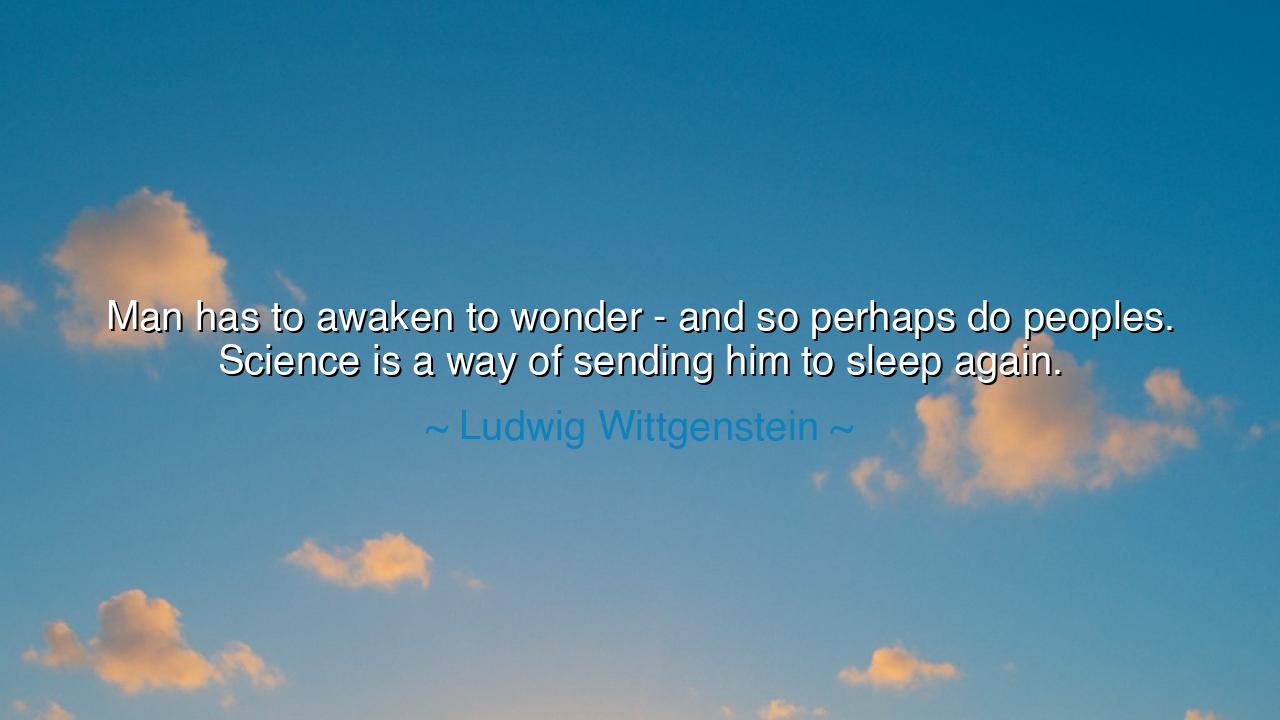
Man has to awaken to wonder - and so perhaps do peoples. Science
Man has to awaken to wonder - and so perhaps do peoples. Science is a way of sending him to sleep again.






"Man has to awaken to wonder - and so perhaps do peoples. Science is a way of sending him to sleep again." These words, spoken by the profound Ludwig Wittgenstein, strike at the very essence of what it means to be human: the eternal search for meaning and understanding. Wittgenstein suggests that within us lies an innate desire to awaken to the mysteries of life, to stand in awe of the world around us. Yet, in our pursuit of science—that powerful force that seeks to explain and measure everything—there is a danger that we may become lulled, like a child who is rocked to sleep by the lullaby of certainty, into forgetting the wonder that lies at the core of existence. Science, in its pursuit of answers, often strips the world of its mystery, replacing the unknown with the known, and in doing so, it risks sending us into a deep, unthinking slumber.
In the ancient world, philosophers spoke often of wonder. Plato, in his writings, described the beginning of wisdom as the spark of curiosity—the sudden wonder that arises when we look at the world and realize that there is more to know, more to understand. He believed that the true philosopher is one who constantly seeks to know and understand, driven by an insatiable desire to grasp the unseen truths that govern existence. Similarly, Socrates believed that the greatest thing a man could do was to question and to wonder, for only through this process could we ever hope to approach the deeper realities of the world. To be in awe of the world was to be alive to its mysteries, and to seek answers was to engage in the noble task of uncovering the truth.
Wittgenstein, however, suggests that in the pursuit of science, we often lose something essential. Science, while it has brought about remarkable achievements, often seeks to categorize, to measure, and to explain. In doing so, it can dull the sharp edge of wonder, for once something is explained, once it is placed neatly into a box of facts, it loses its mystery. The vastness of the universe, the complexities of the human mind, and the mysteries of life are reduced to mere data points, leaving little room for the awe that once made us marvel. It is as if we have traded the great expanse of the night sky for the sterile, predictable world of equations.
Consider the story of Isaac Newton, who, when he gazed at the falling apple, did not simply observe the laws of gravity in scientific terms, but was filled with awe at the sheer mystery of how the universe worked. He did not approach the apple with a detached mind, calculating angles and forces, but with a sense of wonder that led him to seek out the deeper forces that govern nature. Newton did not just uncover a scientific law; he awoke to a mystery that would inspire generations to come. Yet, over time, as his discovery became codified and measured, the wonder of the apple’s fall faded into the background of classroom equations. Science, in its precision, sometimes replaces the awe of discovery with the certainty of knowledge, leaving little room for the sense of wonder that once guided the mind.
In modern times, we see the same dynamic at play. As science unravels the mysteries of the universe, we sometimes forget that the pursuit of knowledge is not only about facts and figures, but about awakening to the profound questions that lie at the heart of existence. The great scientists of history—Einstein, Darwin, Galileo—were not just intellectual giants; they were seekers who, in their own ways, asked the fundamental questions that science could not answer, questions that stirred their souls and filled their hearts with awe. Their discoveries, while grounded in the scientific method, were born from a wonder that transcended mere explanation.
The lesson we can learn from Wittgenstein’s words is one of balance. Science is a powerful tool, one that has brought humanity to new heights and unlocked the secrets of the universe. But science is not the only way to understand the world. Wonder, curiosity, and the willingness to embrace the unknown are equally important. The great achievements of science must be tempered with the humility to recognize that there are aspects of the universe that may always remain beyond our reach, and that this mystery is a source of great beauty and inspiration.
In our own lives, we must strive to maintain the wonder of the ancient philosophers, the curiosity of the great thinkers, even as we embrace the scientific discoveries of our time. We must never lose sight of the fact that the greatest truths of existence are not always those that can be measured or quantified, but those that fill us with awe, that spark a deep sense of connection to the universe. Let us continue to ask the big questions, to seek not just answers, but deeper understanding. In doing so, we will not only expand the horizons of our knowledge, but we will also keep alive the wonder that makes us truly human. For it is through wonder that we are most alive, and it is in seeking the unknown that we discover who we truly are.






AAdministratorAdministrator
Welcome, honored guests. Please leave a comment, we will respond soon